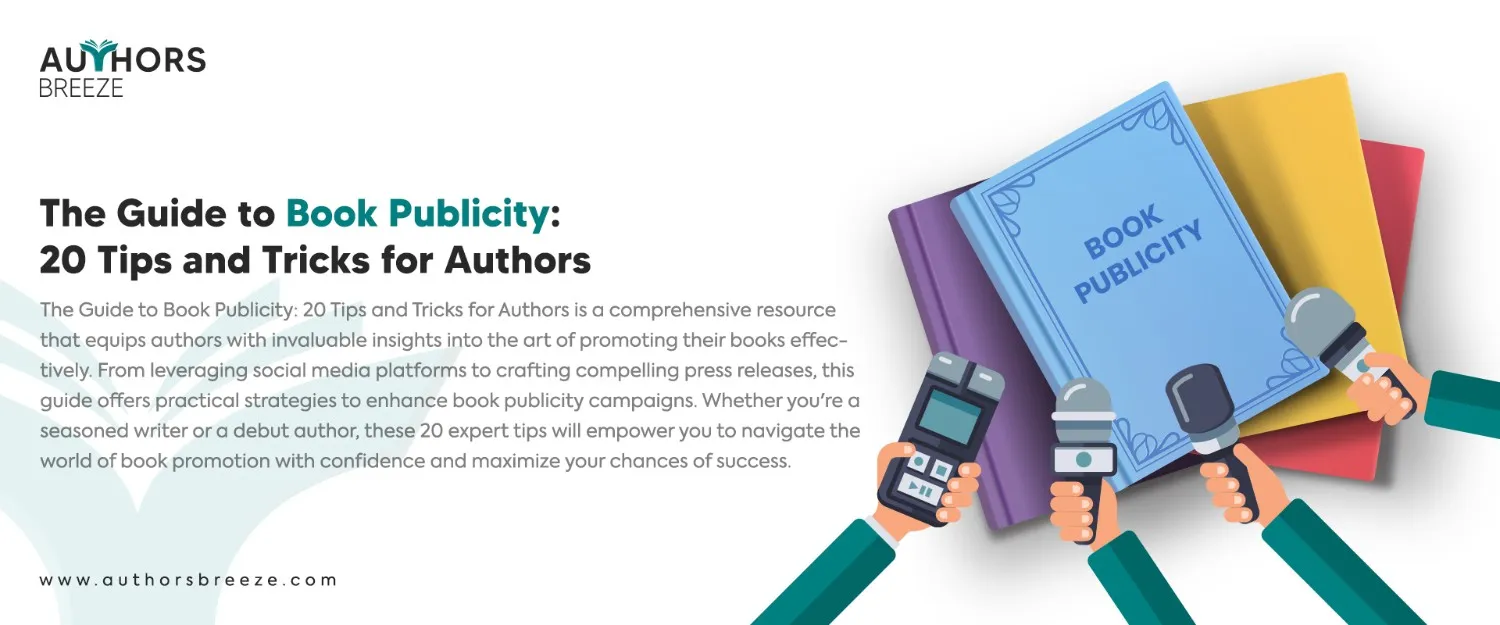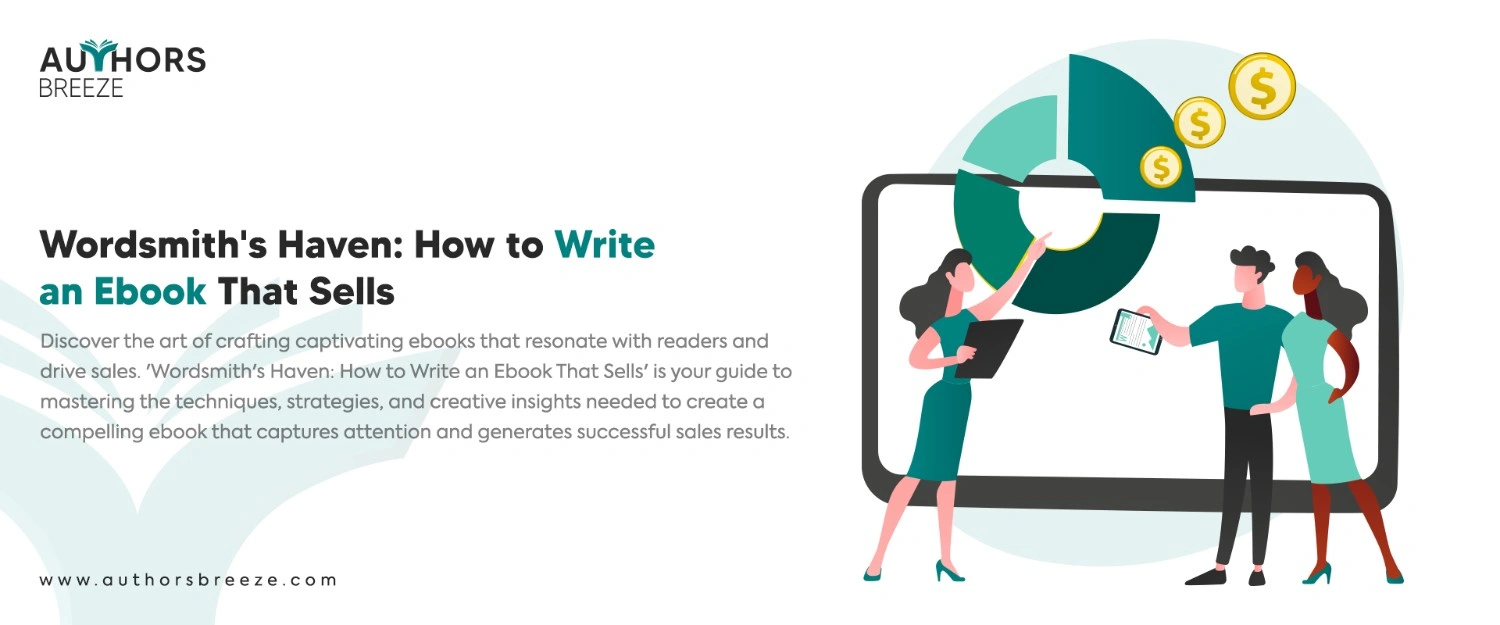Book publicity is the process where you utilize media platforms to promote yourself and your book to both general and specific audiences. Essentially, it involves a mutually beneficial exchange where authors provide material or ideas for a story, article, interview, podcast, etc. And in return, the host or editor promotes their book to their audience.
If you want to get media coverage for your book, it requires effort and a well-executed book marketing plan. It is not something that happens by chance. Authors need to actively seek out opportunities to promote their books and expand their reach, especially if they are new to the publishing world.
Media coverage is valuable. It helps authors attract attention and spread their ideas to a broader audience. However, it is vital to keep in mind that the goal is not just to market the book itself but also to do author publicity and raise awareness about their ideas, products, or services.
Before you go for media coverage, you should clarify and assess how you can leverage them to achieve goals. Once that’s clear, you can start looking for suitable media opportunities.
What is Book Publicity?
Book publicity hold within any efforts that increase awareness of your book and its content. This can include activities like posting about your book launch on platforms such as LinkedIn or Goodreads. It helps spread the word among your network.
However, when people refer to book publicity, it means publicity for books through:
- Media outlets
- Influencers
- Associations
That already has an established audience.
Media coverage holds major value for published authors as it allows them to:
- Expand their reach.
- Connect with new readers.
- Generate interest in their books.
Book publicity is more effective than book advertisements and other paid marketing. It also helps authors establish their credibility and build their platform.
Suppose you meet a potential client and mention your book. When they visit your author website and see positive book reviews from well-known media sources, their interest is likely to be further increased.
It’s essential to note that the best media coverage may not always come from the most prestigious sources. While being featured on CNN is fantastic, it does not guarantee increased book sales or the attraction of new clients.
The key is to obtain media coverage that directly reaches your target audience. It is vital to have your book exposed to people that actively seek content related to your specific topic. Instead, you reach a vast audience that may not have an interest in your subject matter.
Your goal should be to attain the broadest reach possible among your ideal readers rather than aim for sheer quantity. Keep in mind the goal is not solely to secure airtime but to utilize your book campaign as a lead magnet to connect with readers who can help you achieve your broader objectives.
Tips for Getting More Book Publicity
If you follow the tips outlined below, they will help you obtain more book publicity.
1. Know Your Audience
In order to utilize the media to promote your book, you should target the right media outlets that cater to your specific audience, i.e., the readers who are likely to be interested in your book. It is vital for you to recognize that no book appeals to everyone, whether it’s in terms of media or readership. So, clearly define your target audience. As a result, you can approach the right media outlets that cater to that specific audience.
2. Target the Relevant Media Outlets
Research is the backbone of effective book publicity. Identify media outlets that align with the genre, themes, and target audience of your book. Then, pitch your book to these outlets. Make sure to personalize your approach to show genuine interest in their work.
3. Know What Media Outlets Want
Understand the needs and preferences of media outlets. It is crucial when you craft pitches. Also, it will help you know how they identify potential guests and develop story ideas. If you align your outreach with their needs, you can receive a positive response.
4. Do Not Forget to Be Creative
In the highly competitive landscape of media attention, make your book stand out from the crowd. To do so, emphasize the aspects that make it special, distinct, and notable.
Identify the distinct elements of your book that set it apart from others in the market. Is it a fresh take on a popular topic? Does it provide a unique solution or perspective? Highlight these unique selling points when reaching out to the media.
5. Book Publicity is More Than Just Your Book
When you promote a book, the focus is often on you rather than solely on the book itself. So, you should know when you engage with the media, you are primarily marketing yourself as an expert or author. When you secure media coverage, the intention is not to promote the book itself. Instead, the goal is to highlight your expertise and the valuable info you can provide. In addition, the discussion you can initiate. Suppose you gain exposure for yourself. In that case, you also generate exposure for your book.
6. Write a Media Pitch
A media pitch is a concise email or letter where you explain why you would be:
- A guest for a particular show.
- A subject for a feature story or article in a magazine or newspaper.
- A reliable source for expert commentary.
The aim of a good pitch is to be persuasive and capture the interest of the recipient. When you write a pitch, put yourself in the shoes of the editor or producer and consider what would make you genuinely intrigued by someone. Keep it succinct, direct, and focused. Highlight your unique value and relevance to their audience or publication.
7. Develop a Media Kit
When you reach out to the media, it is crucial for you to have a media kit. Media outlets receive many pitches every day. So it is essential to make yourself stand out and appear professional.
An author media kit serves as a resource that media outlets can use to feature your book. It provides them with the necessary materials and details so that they can:
- Generate exciting interview questions.
- Learn about your background.
- Obtain a copy for journalists who might want to write about your book.
A media kit is not a single document but rather a digital stock that can be shared via various platforms. It typically includes:
Book Cover: A image of your professional book cover design.
Author photos: Quality photos of yourself that media outlets can use for promoting purposes.
PDF of your book: A digital copy of your book in PDF format.
List of 5 key ideas: A concise list highlighting the five key ideas or themes from your book.
Book description and info: A detailed description of your book, with notable endorsements or reviews.
Author bio, website, and social media info: Details about you as the author, including your biography, website URL, and links to your social media profiles.
Press release: A book press release that summarizes the key details of your book and its value.
8. Know that Media Needs You Too
Editors and producers indeed rely on book publicists and authors who promote themselves to make their jobs easier. You should have this in mind when marketing books. Contact the media in the proper manner. It positions you as a valuable asset rather than an irritating author. Also, maintain a positive mindset and do not put yourself off if you don’t get responses from editors or producers.
If you shift your perspective, you can recognize that you are someone the media needs. Instead of merely promoting yourself, you are selling yourself as a valuable resource. You have the power to choose which engagements are worth pursuing. This may seem like a simple concept, but it is a mindset that successful media publicists employ. By acting with confidence, you will be perceived as such by the media.
9. Create a Book Video Trailer
Video book trailers can help you get more attention you want from the media. Media outlets not only love great ideas but also authors who can present those ideas in a captivating manner. So, create a book trailer that showcases your talents and captures the interest of the media. In the book trailer, you should be the star. Know that the objective is not to sell your book directly but to use your book as a means to promote yourself.
However, a successful trailer should also effectively convey your book positioning and why it matters. Keep the trailer short and engaging. Similar to movie trailers, viewers prefer concise and exciting snippets rather than lengthy clips. The purpose of the trailer is to hook people and leave them eager for more.
You can take inspiration from other book trailers but create something unique that showcases what sets you and your book apart. Embrace your genuine voice and use it to show to media why you are the perfect fit for their program, podcast, or publication.
10. Do Giveaways
Offer book giveaways for interviews on TV and podcasts. It can be a highly effective strategy for book publicity. Producers and guest bookers appreciate guests who provide books as part of their interviews. Giveaways not only engage the audience and prompt call-ins to shows but also generate interest in your book.
When you offer books as giveaways to those who call in, it creates a perception that your book must be unique and valuable. It entices others to take an interest in it as well. This can lead to increased curiosity and potential book sales.
11. Show You Have Been Featured Before
A key strategy to attract more media attention is to leverage your existing media coverage. If one outlet recognizes you as a valuable guest, it increases the chance that you will be invited by other media outlets too. Here are some ways that you can utilize to maximize your previous media appearances:
- Create a section on your website to showcase your media coverage. Include a list of all your previous appearances, along with any media clips, interviews, or articles.
- Highlight your media appearances on your social media profiles. Share links to interviews, articles, or videos. Also, write catchy captions to pique the interest of your followers.
- Update your LinkedIn profile to include your media appearances. Then, add links to interviews or articles in the “Experience” or “Publications” section. Write a brief description focusing on your key talking points or the value of the coverage.
- Incorporate a quote from the most prominent media appearance in your email signature. When using an email signature, keep it concise and not overload it with excessive info. Choose a quote that entices the recipient to learn more about your media coverage and book.
12. Write A Press Release
Press releases remain a vital tool in book publicity and media, despite changes in the landscape. They serve as the base of your book promotion. They can effectively convey key details about your book to the media and journalists. It is essential to approach press releases with an expert mindset and adhere to the formats and styles that the industry accepts.
Low-quality press releases can convey that the author lacks experience. Media contacts prefer to work with those who present themselves and their info in a polished manner. When you write a press release, you should learn the conventions and standards of the industry. It may differ from general writing skills. So, it is vital to know these practices and follow them accordingly.
13. Write Blogs and Articles
When marketing a book, also go beyond orthodox channels. You should consider online forums that can amplify your message within your target audience. Blogs offer an excellent chance to extend your reach and engage with readers.
The digital landscape is at a rapid pace. Bloggers are constantly on the lookout for fresh and valuable content. This creates an opening for authors to contribute guest blog posts on relevant platforms.
Guest blogging is a two-way thing. Bloggers receive quality content. On the other hand, authors gain exposure and the chance to connect with a new audience by giving professional blog writing services. If you want to make guest blogging effective, ensure that your book and the target audience of the blog align. Bloggers will be more interested in featuring your articles if it resonates with their readership.
14. Keep up with the Trends
Media outlets are often eager to hear from authors who can provide their expertise related to breaking news or trends. As an author, suppose your book aligns with a current topic that can capture public attention. In that case, it will be a great chance to position yourself as an expert and contribute to media discussions. To make the most of this, stay informed about the latest news, trends, and fads within the niche of your book or related areas.
15. Use Old Mailing System
While email is a form of communication that people use commonly, you can not overlook other channels that can help you stand out. Editors and producers receive a major number of emails daily. This makes it almost impossible for your message to capture their attention amidst the flood of pitches. However, other methods, such as mailing a physical letter, can be a practical approach.
If you send a hand-addressed letter, it can be a refreshing change for editors and producers. They likely receive very few envelopes that are written by hand. This personal touch increases the chance of your letter being opened and your pitch being read.
16. Start a Podcast or Featured in One
A great way to promote yourself and your book is to start a podcast. You can also feature in a podcast where the host can interview you. In addition, you can talk about your book or do a Q&A session to brief the audience more about your book.
Search for terms that your book’s audience would use when looking for podcasts. For example, if you are marketing children’s books, your target audience will be children or their guardians. So, search for phrases like “best podcasts for children guardians.” This approach can help you discover podcasts that cater to your specific niche.
When you pitch for podcast interviews, conduct research on podcasts to ensure they align with your target audience. Keep in mind that each podcast may have its own specific submission guidelines. Take the time to visit their websites or review their submission requirements to ensure you follow the appropriate procedures.
17. Stay Alert
Identify keywords and phrases related to your book. Then, stay alert when these relevant topics are in the news. When a topic related to your book receives coverage, it often paves the way for coverage by other media outlets. Media persons are inclined to do follow-up stories and interviews to provide different views or delve deeper into the subject matter.
18. Hire a Book Publicist
You can alleviate your book marketing duty if you hire a book publicist. However, you should know the role of a book publicist and what they can achieve.
The primary job of book publicists is to connect you with relevant media outlets, such as:
- Magazines
- Newspapers
- Radio shows
- Podcasts
They can coordinate book tours and provide details to booksellers to support their buying decisions. However, a book publicist does not develop your marketing plan or identify your target audience and media outlets. You should know and define these aspects before engaging a publicist.
While a book publicist can help you grow your audience and increase exposure, you should have realistic outcomes. When you hire a publicist, it does not guarantee success right away or a major boost in following.
If you want to hire a book publicist, it will be a personal choice and may not be suitable. However, if it aligns with your needs and goals, a book publicist brings relationships with media outlets. It can facilitate connections on your behalf.
19. Set Reasonable Goals
It is not wrong to say that you want to sell eBooks in huge quantities. But the reality is that achieving massive sales numbers is rare. However, this does not mean that you can not achieve good book sales over time through sustained and strategic media outreach and book marketing efforts. So, set realistic expectations. It is essential for long-term success in the book industry.
20. Relish the Experience
The primary goal of book publicity is to make money writing a book or increasing book sales. But there’s an added dimension of excitement and joy that comes with being interviewed and featured by others. It is a unique opportunity that you may get once in a lifetime. So, embrace the journey and relish every moment of it. Approach it with enthusiasm and a sense of adventure.
FAQs
Why is Book Publicity Important?
Book publicity is vital as it helps people learn about a book and its author. It makes more people aware of the book, which can lead to more people wanting to read it. Publicity also helps build a good reputation for the author and makes them more well-known. When a book gets publicity, newspapers, magazines, TV, or online platforms feature it. It makes more people interested in reading it. It can also create conversations so more people know about the book through word-of-mouth. Publicity can also give authors a chance to meet and connect with readers. Overall, book publicity makes a book successful and helps the author become more recognized.
What is a Book Publicist?
A book publicist is a book PR professional working either solo, as a part of a marketing agency, or at a book publishing company. They help you get publicity for your book that is tough for you to get on your own.
What is Publicity in Book Publishing?
After you have written a book, you want people to buy it. This is where book publicity helps you. Publicity means making your book public in a targeted way to the right outlets and readers.
Conclusion
There are many things that authors can do for book publicity. By following the tips and tricks in this blog post, you can learn how to get your book noticed by readers and the media. We hope this blog has been helpful to you. If you want to get affordable book publicity, you can ask Authors Breeze. We are here to provide you with result-driven book marketing services.






